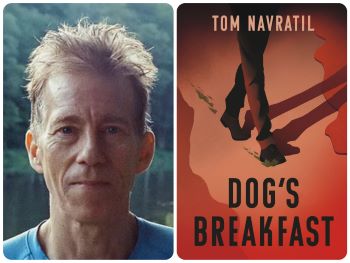By Sagun Shrestha
This article was originally published in The Washington Independent Review of Books here.
A satirical, behind-the-scenes look into the world of diplomatic relations and embassy woes, Tom Navratil’s debut novel, Dog’s Breakfast, depicts career ambitions coming to a head during a fierce battle of wits between a sardonic veteran envoy and a striving junior officer. Set in the U.S. embassy in the fictional country of Vodania, it features Andy Pulano, the ambassador’s second-in-command, who grows tired of being treated with less respect than the ambassador’s prized Labrador retriever and so hatches a series of schemes to undermine his superior. These efforts are jeopardized, however, with the arrival of junior officer Tara Zadani, who, while on doggie duty, discovers information that could put Andy’s entire operation at risk.
In a sea of nonfiction published by Washington insiders, what compelled you to write a satirical novel?
May Dog’s Breakfast float cheekily on that grim and foreboding sea like a bright red bathing suit abandoned by a skinny-dipper. The writing I did as a diplomat — aimed at both internal and external audiences — needed to be accurate, succinct, and persuasive. It was a satisfying and meaningful component of the job, but I felt no inclination to continue in a similar mode after I left. Instead, I wanted to have fun, unconstrained by facts and judicious analysis. I love creating stories without a dress code.
You describe Dog’s Breakfast as a “look at embassy follies and international intrigue.” How much of the novel is true to life, as opposed to embellished for the sake of entertainment?
I made up everything in Dog’s Breakfast, including the country where the story takes place. However, this book sprouted from the well-fertilized soil of my decades as a foreign-service officer. The portrayal of the organizational and social structure of an American embassy, the types of problems diplomats grapple with, the dynamic between Washington and the field, and so on, are all strongly grounded in State Department life as I experienced it. And I hope that, amidst the twists and pratfalls of a ridiculous story, I also tapped into emotional truths.
How does humor translate into a novel, as compared to in shorter-form pieces like the ones you’ve published on Medium and elsewhere?
A short humor piece gets plucked from the vine and served fresh; a novel is a season of feasts. (Let me know if I’m dishing up too many metaphors here.) For both, my goals are the same: to evoke insights and amusement. To work, they have to hold the reader’s attention and build towards something, with no room for padding in either form. I’d say the biggest difference is that a short piece needs to be funny, period, whereas a book-length comedy aims to achieve a tasty mix of drama and humor. It also offers vastly more scope for callbacks, inside jokes, and running gags, which I enjoyed sprinkling into Dog’s Breakfast.
How has your storytelling evolved over the course of your career?
Thank you for assuming it has. From some of my short humor, you could argue it has regressed to a more juvenile level. In any case, one clear change is a movement away from foreign-service stories. My second novel, currently undergoing revision, is a family drama with a diplomatic protagonist, but subsequent manuscripts do not feature a State Department setting. I’ve also noticed that the timelines keep getting shorter. I think I want my stories to inhabit their moment to the fullest.
Of all the exotic and outlandish animals you could’ve picked for the ambassador’s pet, which has a major role in the plot, what made you choose a chocolate Lab?
I love this question because it puts me in a bind. Without revealing anything prematurely, I can say two things. The ambassador’s pet had to be a dog, in keeping with — and in support of — the book’s title. And the reason for choosing that particular breed becomes clear near the very end of the story.

